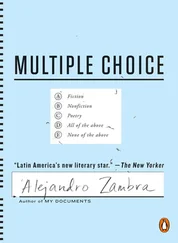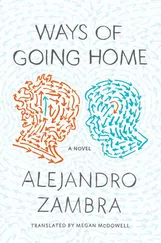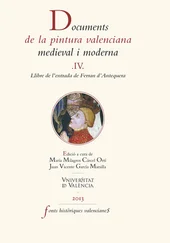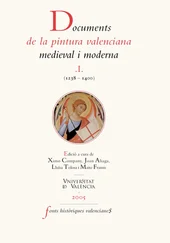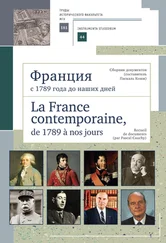An hour later he has made it only seven blocks, but fortunately, at a kiosk, he finds a blue umbrella that costs him ten euros. At first he still feels unstable when he walks, but the umbrella gives him confidence, and after a few steps he feels like he’s gotten used to the wobbling. Only then does he look at or focus on the city; only then does he try to understand it, start to understand it. He thinks it’s all a dream, that he’s near Plaza de Armas, near the Cathedral, in the Peruvian neighborhood, in Santiago de Chile. No, he doesn’t think that: he thinks that he thinks he’s in Plaza de Armas. He thinks that he thinks it’s all a dream.
The stores are starting to close. It’s hard to know if it’s day or night: 5:15 p.m. and the lights of apartments and cars are already on. He starts to walk away from downtown, but instinctively he goes into a Laundromat and decides to spend some time there — he doesn’t really decide this, actually, but this is where he ends up, along with two guys who are reading while they wait for their clothes. It isn’t exactly warm there, but at least it isn’t cold. It’s absurd — he knows that he’s short on money, that he’s going to need every coin — but still he decides he is going to wash one of the pairs of pants, the second shirt, and the extra pair of socks. It takes him a while to figure out how the washing machines work — they’re old and look sort of dangerous — but when he finally gets the apparatus going the victory gives him a stupid and absolute feeling of satisfaction. He sits there looking at the tumbling clothes, entranced or paralyzed, focused like someone watching the end of a championship game on TV, and maybe for him this is even more interesting than the end of a championship game, because while he’s watching the tumbling clothes pushed up against the glass, soaked in soapy water, he thinks, as if discovering something important, how these clothes are his, how they belong to him, how he has worn those pants a hundred times, those socks too, and how once upon a time that shirt, a little faded now, was his best, the one he picked out on special occasions; he remembers his own body wearing that shirt with pride, and it’s a strange vision, vain, awkward. It’s perhaps his kitsch idea of purification.
Then he goes into a pizzeria called Bella Vita, which looks cheap. His waiter is a man named Bülent, a very friendly and cheerful Turk who speaks some French and a little Flemish but no English, so they have to communicate exclusively through gestures and a reciprocal murmur that perhaps serves only to demonstrate that neither of them is mute. He eats a Napolitano pizza that tastes out of this world to him, and then he sits there, drinking a coffee. He doesn’t know what to do, he doesn’t want to go on wandering, but he can’t make up his mind to look for a cheap hotel or a hostel. He tries to ask Bülent if the place has Wi-Fi, but it is truly difficult to mime the idea of Wi-Fi, and at this point, he is already so helpless that he doesn’t think of the simplest option, which would have been to say “Wi-Fi” and pronounce it in all possible ways until Bülent understood. Luckily Piet arrives just then; he’s a very tall guy who wears glasses with thick red rims and has an unspecifiable number of piercings in his right eyebrow. Piet knows English and a little Spanish — he has even been to Chile, for a month, years ago. Rodrigo finally has someone to talk to.
A couple of hours later they are in the living room of Piet’s beautiful apartment, across from the pizzeria. While his host makes coffee, Rodrigo watches from the window as Bülent, with the help of the waitress and another man, closes the place up for the night. Rodrigo feels something like the pulse or the pain or the aura of daily life. He turns on his laptop and connects to the Internet; there are no messages from Elisa, but he wasn’t really expecting any. He tries to find a friend from high school who, as he remembers, has lived in Brussels for several years. He finds him easily on Facebook, and the friend responds right away but says that he’s in Chile now, taking care of his sick mother, and although he plans to come back to university, for now he’s going to stay in Santiago, he doesn’t know for how long. Ten minutes later he gets another message in which the friend recommends that he not be afraid to drink peket (“It’s a good buzz, but a bad hangover”), that he avoid the grilled endive (“No to the grilled endive, yes to the boulettes de viande and to the moules-frites ”), that he try the hot dogs with warm sauerkraut and mustard, that he buy chocolates at Galler, near the Grand Place, that he go to the Tropismes bookstore, and that he shouldn’t miss the Musical Instrument or the Magritte Museums — to Rodrigo, all of these details seem remote, almost impossible, because this isn’t a vacation, it never was. He feels desperate. He doesn’t have much credit left on his card, and he has only a hundred euros left in his wallet.
That’s when Bart arrives, Piet’s editor, who lives in Utrecht. Only then does Rodrigo find out that Piet is a writer, that he has published several books of short stories and a novel. He likes that Piet showed this kind of discretion, that he was so reserved. He thinks that if he were a writer, he wouldn’t go around proclaiming it to all the world either.
Bart is even taller than Piet, he’s a giant of almost two meters. Along with a friend, who is also named Bart, he runs a small press that publishes emerging writers, almost all of them fiction writers, almost all of them Dutch, but there are a few Belgians, also. The other Bart, oddly, lives in Colombia (because he fell in love with a woman from Popayán, Rodrigo learns), but he handles everything online from there: his job is to manage distribution — to a series of small bookstores, none of them commercial — and to organize small events and readings where he sells the books himself.
Bart is friendly and he tells his story in pretty fluent English, though he is also helped by his emphatic gestures and a certain talent for mimicry when words fail him. It’s almost ten; they walk for a few blocks. Rodrigo feels better, he leans on the umbrella-cane, but it’s more of a precaution than a necessity. They reach La Vesa, a somewhat gloomy bar that has poetry readings on Thursdays, but today isn’t Thursday, it’s Tuesday, and the patrons are scarce, which is better, thinks Rodrigo, who enjoys this feeling of intimacy, of routine camaraderie, this sensible chatting with new friends, and the comments — short but laden with slight ironies — that come every once in a while from Laura, an Italian waitress who isn’t beautiful at first sight, but who becomes beautiful as the minutes pass, and not from the effect of the alcohol, but because you have to look at her really closely to discover her beauty. His friends are drinking Orval and Rodrigo orders wine by the glass; Piet asks him if he dislikes beer, and he replies that he likes it, but he’s still too cold and he prefers the warmth of wine. They start talking about Belgian beer, which is the best in the world. Piet tells him it’s not so cold out, that there have been many worse winters. Then Rodrigo wants to tell them the joke about the coldest man in the world, but he doesn’t know how to say friolento , “cold-blooded,” in English, so he says “I am” and makes the gesture of shivering, and Bart tells him, “You’re chilly,” and it all gets tangled up because Rodrigo thinks they’re talking about Chile, about whether he’s from Chile, which supposedly they already knew, until, after several misunderstandings that they celebrate thunderously, they understand that the joke is about the chilliest man on earth, and Rodrigo adds that the most cold-blooded man on earth is definitely Chilean, he’s the chilliest man on earth, and he laughs heartily, for the first time he laughs on Belgian soil the way he would laugh on Chilean soil.
Читать дальше

